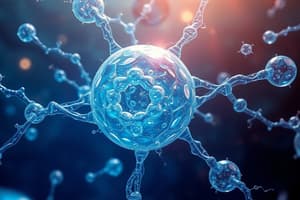Podcast
Questions and Answers
What is the fundamental unit of life?
What is the fundamental unit of life?
- Organism
- Atom
- Tissue
- Cell (correct)
Which of the following processes is part of catabolism?
Which of the following processes is part of catabolism?
- Protein synthesis
- Photosynthesis
- Cellular respiration (correct)
- DNA replication
What type of biological molecule is primarily responsible for storing genetic information?
What type of biological molecule is primarily responsible for storing genetic information?
- Nucleic acids (correct)
- Lipids
- Carbohydrates
- Proteins
Which branch of biology studies life forms at the microscopic level?
Which branch of biology studies life forms at the microscopic level?
What role do proteins play in living organisms?
What role do proteins play in living organisms?
What is the primary function of natural selection in the process of evolution?
What is the primary function of natural selection in the process of evolution?
Which of the following best describes what a phylogenetic tree represents?
Which of the following best describes what a phylogenetic tree represents?
Which key ecological concept refers to the patterns of movement and transformation of matter through an ecosystem?
Which key ecological concept refers to the patterns of movement and transformation of matter through an ecosystem?
Which of the following is NOT considered a biological process?
Which of the following is NOT considered a biological process?
What is the correct order of steps in the scientific method?
What is the correct order of steps in the scientific method?
Flashcards
What is biology?
What is biology?
The study of life and living organisms, encompassing their structure, function, growth, origin, evolution, and interactions. It explores the diversity of life on Earth, from microscopic microbes to complex ecosystems.
What are biological molecules?
What are biological molecules?
They are complex molecules essential for life. They include carbohydrates for energy and structure, lipids for energy storage and membranes, proteins for various functions, and nucleic acids (DNA & RNA) for genetic information.
What is a cell?
What is a cell?
The basic, fundamental unit of life, capable of independent existence.
What is metabolism?
What is metabolism?
Signup and view all the flashcards
What is evolution?
What is evolution?
Signup and view all the flashcards
Natural Selection
Natural Selection
Signup and view all the flashcards
Common Ancestry
Common Ancestry
Signup and view all the flashcards
Phylogenetic Tree
Phylogenetic Tree
Signup and view all the flashcards
Ecology
Ecology
Signup and view all the flashcards
What is the scientific method?
What is the scientific method?
Signup and view all the flashcards
Study Notes
Introduction to Biology
- Biology is the natural science that studies life and living organisms, including their physical structure, chemical processes, molecular interactions, physiological mechanisms, development, and evolution.
- It explores the diversity of life on Earth, from microscopic organisms to large mammals.
- Key branches of biology include: zoology (animals), botany (plants), microbiology (microorganisms), genetics, ecology, and physiology.
- Understanding biological processes is crucial for advancing medicine, agriculture, and other fields.
Biological Molecules
- Living organisms are composed of complex molecules, including carbohydrates, lipids, proteins, and nucleic acids.
- Carbohydrates serve as a primary energy source and structural components.
- Lipids store energy, form cell membranes, and act as hormones.
- Proteins perform a wide range of functions, such as catalyzing reactions, transporting molecules, and providing structural support.
- Nucleic acids, DNA and RNA, store and transmit genetic information.
Cell Structure and Function
- The cell is the fundamental unit of life.
- Eukaryotic cells are complex, containing membrane-bound organelles like the nucleus, mitochondria, and Golgi apparatus.
- Prokaryotic cells are simpler and lack these specialized structures.
- Cells carry out various functions essential for life, such as energy production, protein synthesis, and waste removal.
- Key organelles include ribosomes (protein synthesis), endoplasmic reticulum (protein modification), and vacuoles (storage and transport).
Cell Metabolism
- Metabolism refers to all the chemical reactions that occur within a living organism.
- Catabolism involves breaking down complex molecules to release energy.
- Anabolism involves using energy to build complex molecules.
- Cellular respiration is a key catabolic pathway for producing ATP (adenosine triphosphate), the primary energy currency of cells.
- Photosynthesis is a unique anabolic process that converts light energy into chemical energy in plants.
Genetics
- Genetics studies heredity and the variation of inherited characteristics.
- Genes, segments of DNA, carry the instructions for building and maintaining an organism.
- DNA replication ensures the accurate transmission of genetic information.
- Mutations in DNA can lead to changes in traits and contribute to evolution.
Evolution
- Evolution is the process by which populations of organisms change over time.
- Natural selection is a key mechanism of evolution, where organisms with advantageous traits are more likely to survive and reproduce.
- Common ancestry explains the shared characteristics among different species.
- Evolutionary relationships are often represented in phylogenetic trees.
Ecology
- Ecology studies the interactions between organisms and their environment.
- Ecosystems encompass the biotic (living) and abiotic (non-living) components of an area.
- Key ecological concepts include energy flow, nutrient cycles, and population dynamics.
- Biodiversity is crucial for maintaining healthy ecosystems.
Diversity of Life
- There is a vast diversity of life on Earth, classified into different kingdoms, e.g. plants, animals, fungi, protists, and bacteria.
- Classification systems organize species based on shared characteristics.
- Phylogenetic trees depict evolutionary relationships among species.
- Species adaptation to varying environments reflects the diversity of life.
Biological Processes
- Examples of biological processes include:
- Growth and development
- Reproduction
- Response to stimuli
- Homeostasis
Scientific Method
- The scientific method is a systematic approach to understanding the natural world.
- It involves observation, questioning, hypothesis formation, experimentation, data analysis, and conclusion formation.
- Scientific findings are often reviewed by other scientists to ensure their validity.
Studying That Suits You
Use AI to generate personalized quizzes and flashcards to suit your learning preferences.



